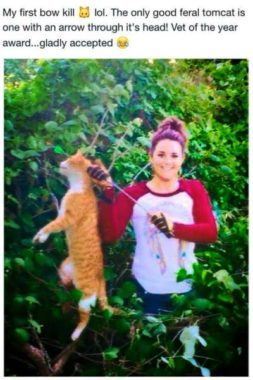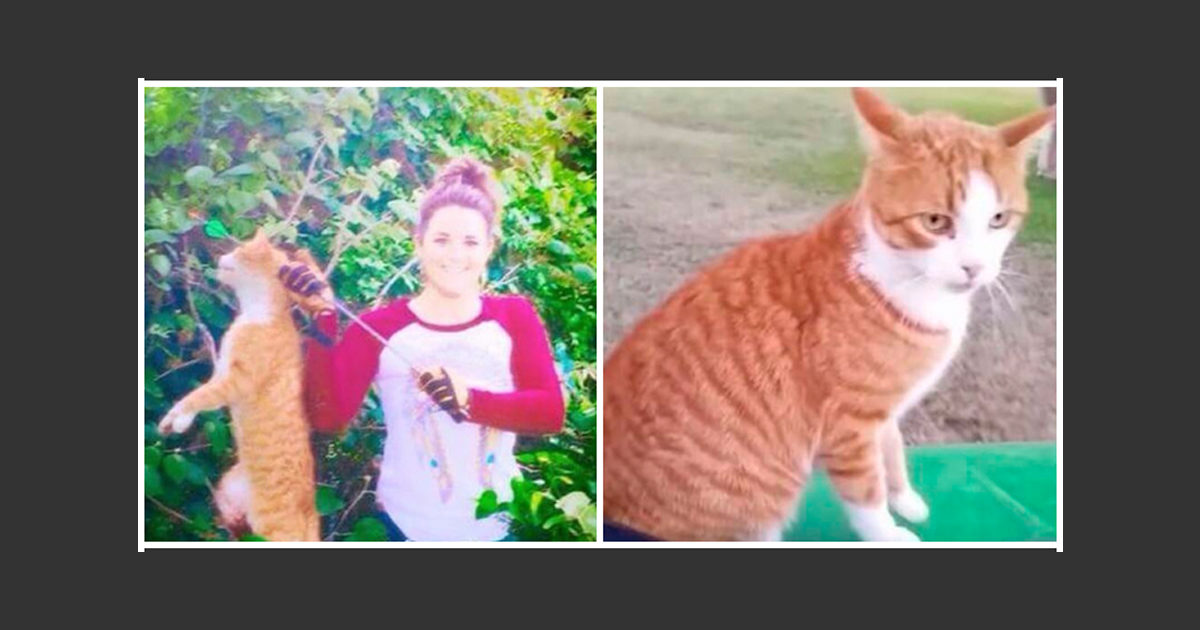
Fighting to Bring Kristen Lindsey to Justice
Kristen Lindsey v Texas State Board of Veterinary Medical Examiners
Veterinarian Kristen Lindsey shot and killed her neighbor's cat Tiger with a bow and arrow. Afterward, Lindsey posted a photo to Facebook of herself with Tiger's corpse, the arrow protruding from his head. She bragged in the post about killing the cat.
Next Step
Case Closed
Kristen Lindsey is a Texas veterinarian, who in 2015 shot and killed her neighbor’s cat Tiger with a bow and arrow. Her action came to light when she posted a photo of herself on Facebook, grinning as she dangled the still-impaled cat by the shaft of the arrow. In the caption she bragged, “My first bow kill, lol. The only good feral tomcat is one with an arrow through it’s [sic] head! Vet of the year award … gladly accepted.”
Vet of the year? Hardly. In a blog post before the killing, Lindsey wrote that her current interests include “…killing things or trying to kill things (animals, a full glass of whiskey, hangovers, etc.).”
 The photo provoked international outrage, especially when it came out that the cat, an orange tabby named Tiger, belonged to Lindsey’s neighbors but had gone missing. Reaction to Lindsey’s act was swift. Her employer, Washington Animal Clinic, fired her. Her alma mater, Colorado State University College of Veterinary Medicine and Biomedical Sciences “decr[ied] the grotesque actions and comments displayed in [Lindsey’s] post.”
The photo provoked international outrage, especially when it came out that the cat, an orange tabby named Tiger, belonged to Lindsey’s neighbors but had gone missing. Reaction to Lindsey’s act was swift. Her employer, Washington Animal Clinic, fired her. Her alma mater, Colorado State University College of Veterinary Medicine and Biomedical Sciences “decr[ied] the grotesque actions and comments displayed in [Lindsey’s] post.”
The Animal Legal Defense Fund is among those who called for Lindsey to be prosecuted. We filed a complaint with the Texas Board of Veterinary Medical Examiners seeking to strip Lindsey of her veterinary license.
While the Austin County District Attorney disappointingly declined to prosecute Lindsey, the Texas Board of Veterinary Medical Examiners moved to revoke Lindsey’s license. Lindsey rejected that recommendation.
The matter then proceeded to the Texas State Office of Administrative Hearings for a hearing. Two administrative judges recommended Lindsey’s license be suspended for five years. For the first year she’d be barred from practicing, for the following four she’d be on probation and could practice with the supervision of another veterinarian.
The Texas Board of Veterinary Medical Examiners accepted these recommendations. Lindsey appealed, and lost. In 2018, the Third Court of Appeals in Texas upheld the Board’s decision, and ordered Lindsey to repay all costs related to the appeal.
The Animal Legal Defense Fund Presses for Justice
A grand jury investigated the killing but, in June 2015, found there was “insufficient proof” to charge Lindsey with animal cruelty.
The Austin County District Attorney’s office then closed the case, claiming it could not confirm where the cat was killed, whether the cat had an owner, and whether the cat was killed “in a cruel manner.”
Concerned that the District Attorney’s office might not have properly presented the evidence to the grand jury, The Animal Legal Defense Fund immediately requested all records related to the case through the Texas Public Information Act. The District Attorney’s office refused to release the records, citing multiple discretionary exemptions from disclosure, and asked the Attorney General for a final opinion.
We subsequently filed a formal complaint with the Texas Board of Veterinary Medical Examiners urging the board to revoke Lindsey’s license to practice veterinary medicine. In the complaint, and in testimony at a hearing before the Board, the Animal Legal Defense Fund argued that Lindsey had violated the Texas cruelty code and, in turn, the Board’s rules of ethics.
The Board agreed, ultimately recommending that Lindsey’s license be revoked, given her “demonstrated callous indifference to animal pain and suffering.”
When Lindsey rejected the Board’s decision, the Board filed a formal complaint with the Texas State Office of Administrative Hearings. That hearing took place in April 2016. In October of that year, two administrative judges recommended that Lindsey’s license be suspended for five years. She’d be unable to practice for one year, then on probation for four more during which she could practice with the supervision of another veterinarian.
The Board accepted these recommendations. Lindsey appealed, and lost. In 2018, the Third Court of Appeals in Texas upheld the Board’s decision, and ordered Lindsey to repay all costs related to the appeal.
Kristen Lindsey Should Have Been Prosecuted For Killing Tiger
The Animal Legal Defense Fund is relieved that Lindsey suffered some consequences for killing Tiger in this heinous way. But the penalties were too light, and the evidence shows that Lindsey should have been prosecuted for killing Tiger the cat.
After the Austin County District Attorney’s Office refused to charge Lindsey with animal cruelty, more information came to light that confirms Lindsey’s actions were criminal cruelty and should have opened the door to prosecution.
- Lindsey acknowledged in a signed affidavit appealing the Board’s revocation decision that the killing “occurred on [her] property” in Austin County, Texas.
- Although the District Attorney’s office cited American Veterinary Medical Association (AVMA) guidelines for humane killing in its finding that Lindsey may not have killed the cat “in a cruel manner,” the AVMA released a statement rebutting the DA’s analysis.
- Lindsey claimed the cat she killed was feral. Texas Penal Code Section 42.092(a)(2) includes feral cats under its definition of protected “animals.”
- Texas Penal Code Section 42.092(b) prohibits killing an animal “without the owner’s effective consent.” If the cat was feral, there was no way to get the “effective consent” of a nonexistent owner. But Lindsey’s neighbors, who were out of town when the killing occurred, identified the cat in the photo as their cat Tiger, based on his distinctive markings. And according to the Board’s formal complaint against Lindsey, Tiger had been a patient at the Washington Animal Clinic—Lindsey’s former employer. In either case, Lindsey lacked an “owner’s effective consent.”
Given this new information, the Animal Legal Defense Fund wrote the Austin County DA’s office on November 12, 2015, requesting that it reopen the case. To date, the case has not been reopened. The only penalty Kristen Lindsey suffered for shooting and killing Tiger with a bow and arrow is the temporary loss of her license.
This case highlights the urgent need for animal abusers to be brought to justice, through stronger animal protection laws and stronger enforcement of those laws. The Animal Legal Defense Fund uses every tool at our disposal to fight for justice for victims of animal cruelty.

Timeline
View:
-
May 31, 2019
The Texas Supreme Court rejects Lindsey’s appeal.
-
July 17, 2018
Kristen Lindsey appeals the suspension of her license to the Texas Supreme Court.
-
April 27, 2018
The Third Court of Appeals in Texas upholds the Texas Board of Veterinary Medical Examiners’ suspension of Kristen Lindsey’s veterinary license and orders Lindsey to pay all costs associated with her s. The Animal Legal Defense Fund is pleased that the suspension was upheld, though the punishment for Lindsey’s intentional killing of Tiger the cat is inadequate.
-
July 25, 2017
Judge Karin Crump upholds the Texas Board of Veterinary Medical Examiners’ suspension of Kristen Lindsey’s veterinary license.
-
November 11, 2016
The Animal Legal Defense Fund urges the Austin County District Attorney to reopen the animal cruelty case against Lindsey based on new evidence uncovered during the Texas Board of Veterinary Medical Examiner’s hearings. The letter outlines how “the evidence that Ms. Lindsey committed animal cruelty is substantial and undeniable.”
-
October 18, 2016
The Texas Board of Veterinary Medical Examiners evaluates a Proposed Decision by Administrative Judges of the Texas State Office of Administrative Hearings to temporarily suspend Lindsey’s license. The Animal Legal Defense Fund attends the Board meeting and presents comments—urging full revocation of Lindsey’s license as a Class A violation of the Board’s rules—during the public comment portion of the meeting. The Veterinary Board makes its final decision to impose only a temporary suspension of Ms. Lindsey’s license as a Class B violation of its rules: a five-year suspension, during which Lindsey is only forbidden from practicing veterinary medicine for the first year, followed by a four-year suspension during which she can practice under supervision and must complete continuing education in animal welfare.
-
July 18, 2016
The judges assigned to the case deny Lindsey’s motion, stating that she had failed to show good cause to grant the motion.
-
June 10, 2016
Kristen Lindsey files motion for partial retrial alleging a witness was not impartial.
-
April 28, 2016
Kristen Lindsey faces the Texas Board of Veterinary Medical Examiners over the revocation of her veterinary license before two administrative law judges.
-
November 12, 2015
The Animal Legal Defense Fund requests that the Austin County District Attorney’s office reopen the animal cruelty case against Kristen Lindsey given new developments in the case including (1) Lindsey’s admission that the killing took place on her property, and (2) the American Veterinary Medical Association’s statement finding the District Attorney’s application of the AVMA’s Euthanasia Guidelines to be “seriously flawed.”
-
October 2, 2015
The Texas Board of Veterinary Medical Examiners files a formal complaint with the State Office of Administrative hearings, seeking revocation of Lindsey’s veterinary license due to Lindsey’s violations of the Veterinary Licensing Act and the Board’s Rules of Professional Conduct.
-
August 28, 2015
The Animal Legal Defense Fund testifies at an informal hearing before the Texas Board of Veterinary Medical Examiners in support of our’s complaint against Lindsey. The Board’s Enforcement Committee finds that a violation occurred.
-
June 30, 2015
The Animal Legal Defense Fund files a complaint with the Texas Board of Veterinary Medical Examiners, arguing that Lindsey committed the crime of animal cruelty under Texas law and therefore violated the Board’s Rules of Professional Conduct.
-
June 26, 2015
The Animal Legal Defense Fund calls on the Austin County District Attorney’s office to produce all documents related to Lindsey’s case so that we, and others, could examine what appears to be faulty legal reasoning in dismissing the animal cruelty case against Lindsey on June 24.
-
June 24, 2015
After the Austin County ’s office presented evidence to a grand jury, the grand jury decided there was “insufficient proof” to charge Lindsey with animal cruelty (resulting in a “no bill”). The DA’s office then closed the case, and said in a statement that they lacked proof that the cat was killed in a cruel manner, or that the incident occurred in Texas.
Recent News
-
Veterinary Board Temporarily Suspends Kristen Lindsey’s License
The Animal Legal Defense Fund is deeply disappointed by the Veterinary Board’s decision to only temporarily suspend Kristen Lindsey’s veterinary license.October 18, 2016 Press Release -
Animal Legal Defense Fund Commends Court’s Upheld Suspension of Kristen Lindsey’s Veterinary License
In 2015 Lindsey shot a cat with an arrow, killing him, then bragged about it on Facebook.August 3, 2017 Press Release -
District Attorney’s Handling of Cat Shooting Case Probed by Animal Legal Defense Fund
The Animal Legal Defense Fund invited Austin County District Attorney Travis J. Koehn under the Texas Public Information Act to produce all records relating to the criminal case against Kristen Lindsey.June 26, 2015 Press Release
Related Cases
-
Challenging a Florida Kitten Breeder’s Cruelty and Fraud
Rozetti v. Adorable Stars
-
Lawsuit Against Barbour County for Violating State Animal Control Law
Klein v. Barbour County Commission
Looking for case and legal resources? View Resources
See More





